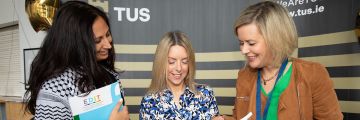This toolkit was created by SETU in conjunction with Atlantic Technological University (ATU), Technological University of the Shannon (TUS), and Munster Technological University (MTU). It has been developed as part of Embedding Equality Diversity & Inclusion in the Curriculum of the new TU Sector (EDIT) project and is designed as a practical guide to support the sector in implementing inclusive curriculum principles across their universities.
Practical guide
It is intended as a practical guide for use by departments and their academic and professional staff at all levels to support them in embedding equality, diversity, and inclusion in the curriculum and related areas of practice. It aims to make higher education in the sector an inclusive and positive experience that welcomes diverse students and supports them to succeed.
This toolkit is the culmination of over two years of work and is the product of significant consultation with our colleagues across our universities.
Dr Allison Kenneally Vice President for Equality, Diversity and Inclusion at SETU
TUs developed the toolkit with expertise available through Advance HE, and with funding from the Higher Education Authority (HEA) under its Gender Equality Enhancement Fund.
The launch of the toolkit took place at the national Equitas – EDI in Higher Education Conference held at TUS.
Speaking at the launch, Dr Allison Kenneally, Vice President for Equality, Diversity and Inclusion at SETU, who was the project lead, said, “I am truly delighted to launch the EDIT toolkit, amongst such a wonderful community of EDI professionals, academics, and researchers across Ireland. This toolkit is the culmination of over two years of work and is the product of significant consultation with our colleagues across our universities.
Once-in-a-generation opportunity
“In the TU sector, we have a once-in-a-generation opportunity to ensure that EDI becomes a key feature of our student experience through our curricula content and delivery, and this toolkit aims to provide the very tools needed to ensure that we seize this opportunity.”
“It will be of practical use, not only in TUs but in all HEIs and indeed, to the further education sector. We hope that it inspires and challenges us all who work in HEIs to do better and that ultimately, it will help contribute to better experiences and outcomes for both our students and society,” Dr Kenneally added.
Further information on the toolkit is available at edittoolkit.ie


